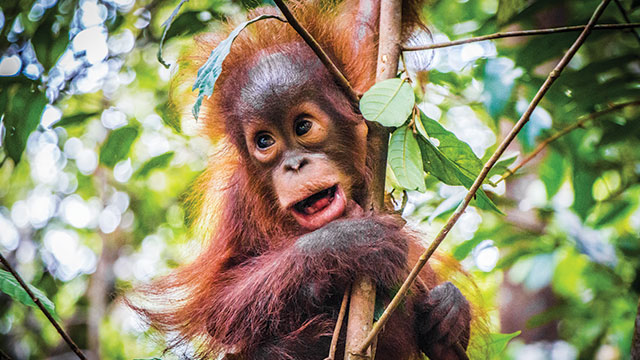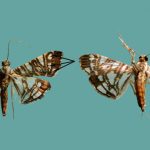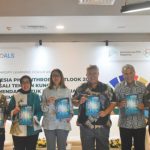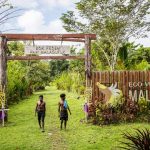Jakarta (Greeners) – Throughout 2020, the global community has witnessed how the Covid-19 pandemic has been limiting humans’ social life. State authorities, health experts have come up with rules and adjustments to guide citizens’ safety during the pandemic. It is not only humans who experience changes during an epidemic. Animal conservation practitioners have also witnessed changes due to the impact of the Covid-19 pandemic.
Field Assistant III Centre for Orang Utan Protection (COP), Ramadhani, shares stories about the process of preserving orangutans in Berau, East Kalimantan (Kaltim). The man who prefers to be called Dhani, explains that since the outbreak of the Covid-19 virus, the East Kalimantan Natural Resources Conservation Center (BKSDA) had stopped all types of visiting activities. It includes the orangutan rehabilitation center.
“The rehabilitation center has three work locations: the rehabilitation center, the pre-release island, and the release location. At the end of March 28, the location is vacated. We withdrew all animals and employees,” said Dhani in the 2020 Greeners’ webinar Hari Cinta Puspa dan Satwa: The Challenge of Fauna Conservation in the Pandemic Era, Thursday (12/11/2020).
Facing Pandemic, COP Designs SOP for Orangutan Conservation
Further, Dhani explains that after the withdrawal, orangutan rehabilitation activities were minimal. COP also arranged the workers’ holiday schedule not to have much physical contact with the outside community. His party does not want to take risks, given the relatively high spread of Covid-19 cases in Berau. Further, studies on the impact of the Covid-19 virus on primates have not been carried out, so COP must be extra careful. They are worried that the Covid-19 virus will be bad for orangutans, considering that their DNA from humans is only 3% different.
After almost five months of inactivity, his office has developed a health protocol for orangutan preservation in the form of Standard Operating Procedures (SOP). The SOP, Dhani continues, was a form against the never-ending Covid-19 pandemic. On the other hand, the orangutans have been spending five months entirely in the cage.
“In August, we dared to make our SOP. We thought that Covid-19 must be ‘fought.’ Usually, after work, employees can take a break, now they must quickly clean up. It includes doing rehabilitation activities,” he explains.
WCS: Declining Demand, Shark Landings Decrease
Another view of animal conservation during the Covid-19 pandemic emerged from the water sector. On the same occasion, Marine Policy Coordinator, Wildlife Conservation Society (WCS), Ita Sualia, says that for shark and stingray conservation activities, there was a positive impact from the Covid-19 pandemic. Sharks and rays, she continues, are the top predators in the sea, so it is vital to maintain the ecosystem’s balance. However, the two species’ exploitation activity is also high, both from within the country and abroad.
With the Covid-19 pandemic, marine activities such as shipping, transportation, and tourism have been closed. Threats to sharks and rays such as fishing, overfishing, etc., have also decreased. The price for both of them has also reduced given the lack of demand.
“In the Lampulo Aceh area, Tanjung Luar, if we look at the number of sharks that have been landed, it is very significantly lower. It is because the market demand and shipments were stagnating. This is a positive thing from the reduction in fishing effort pressure,” says Sualia.
Baca juga: Government Ignores Komodo Researchers on Rinca Island Project
Animal Conservation Activists Suspect Increased in Animal Poaching during Covid-19 Pandemic
Both Dhani and Sualia argue that most local communities turn to make animal hunting their livelihood during the pandemic. Not only as a hobby, but some parties hunt to sell their catch, given that the Covid-19 plague also resulted in many employees being laid off (PHK).
“Several companies that have laid off their employees have also triggered an increase in hunting. Confusion of the village people led them by entering the forest and hunting for animals,” says Dhani.
Echoing Dhani, Sualia assesses that the sluggish tourism sector has made coastal communities turn to fishers. On the other hand, Covid-19 pandemic also limited the conservationist process of monitoring trade and arrests. Sualia concludes that specific individuals can take advantage of the situation.
“We cannot do the monitoring and verification of catches in the field. It is only through cellphones. The opportunity for entrepreneurs or individuals to replace identified products is very high. Apart from that, for marine patrols, the budget has been diverted to prioritize Covid-19,” she says.
Talking about poaching and illegal animal trade, the Executive Coordinator of the Asian Waterbird Census Indonesia from Wetlands International Indonesia, Ragil Satriyo Gumilang, argues that law enforcers’ ability to prevent illegal hunting activities is minimal. For that, he invites the participation of the general public to help through complaint information.
Gumilang also urges the law enforcement agencies related to illegal hunting to improve their handling system. For example, to block access to information on poaching or illicit trade. Gumilang says that reports from the public have to go through a lot of bureaucracy before there is any action.
“If (reporting handling) is systemized, it’s good. No need for a long and bureaucratic process,” Gumilang concludes.
Reporter: Muhammad Ma’rup
Editor: Ixora Devi



















































